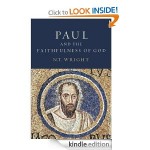The second massive volume (910 pages of text and notes, never mind voluminous bibliography) focuses on Pauline theology proper, and Paul’s Aims and Intentions. Tom stakes out his turf in the Introduction. The way he will approach the task is based on the following basic assumptions (which proves that Wright completely rejects the form critical approach to the text): 1) he assumes the Pauline letter has an inner logic and a central concern, and 2) “I take it as axiomatic on the contrary that Paul deliberately lays out whole arguments not just bits and pieces, miscellaneous topoi which just happen to turn up in these irrelevant contexts” (p. 610). Exactly so, which is precisely why a rhetorical analysis of whole arguments in Paul’s discourses is crucial. It’s not enough to examine the minor rhetorical devices, the micro rhetoric, when it is the macro rhetoric, the whole arguments, that are driving the train.
Another fundamental assumption comes to light on p. 611– Tom sees salvation has best dealt with under the heading of election (remembering his big ticket categories as monotheism, election, eschatology). In this Tom makes clear once more than he is a Reformed scholar, with some basic Reformed assumptions. My response to this is that ‘election’ basically has to do with vocation not personal or individual salvation. This is especially clear in the OT where the Christian concept of salvation=gift of everlasting life from Jesus, does not even surface and yet we have plenty of discussion about election. I do however think Tom and I agree that where election is discussed it is a corporate notion— it happens in Israel in the OT, and in Christ in the new. More on this later. For now it’s enough to point out that Tom resists the usual tendency to make soteriology the central category or lens through which we read Pauline theology.
In identifying the main thing Paul needed to come to grips with as he was reconfiguring the central Jewish beliefs in monotheism, election, and eschatology, reconfigured on the basis of Messiah and Spirit, Wright finds himself in fundamental agreement with Wayne Meeks when he says “For Paul himself, the central problem is not just to spell out the implications of monotheism, but to explain how the unified purpose of God through history could encompass the novum of a crucified Messiah.” (p. 612 n. 9, quoting Meeks 1983 classic ‘The First Urban Christians’).
Tom also continues to stress from the outset that Paul is not simply having an intramural Jewish conversation with other Jews about their Jewish worldview. As he says on p. 613 Paul is in constant dialogue with the pagan world, insisting that the transforming power of the Gospel upstages the philosopher’s dream and quest for a true humanity, and he encourages the churches to live with a spirit and koinonia that pagan religion had been striving towards but not achieving, and he believed the lordship of Christ upstages the grandeous claims to divinity of the Emperor.
Paul was quite capable of taking every thought captive for Christ, and so he does sometimes borrow ideas from pagan philosophy, but his basic framework and modus operandi is Jewish. “The fact that humanness had been spoilt by idolatry did not mean that the divine plan of salvation involved the abandonment of humanness.” (p. 614).
Interestingly, Tom (p. 616) illustrates how he views Paul’s thought by means of a drawn box. On the front there are the big ticket categories– monotheism, election, eschatology. On the right side Messiah and spirit, and his point is that the latter reconfigure how he views the former, and all of this runs right through his thought. The base of the box is the Jewish Bible– the foundation of his thought, but the lid of the box is the pagan world which he is in constant engagement with as the apostle to the gentiles. With this in mind he turns to the exposition of Paul’s theology of God the Creator…














